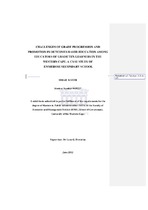| dc.description.abstract | Within the field of secondary education in South Africa there is currently a major
crisis over learners’ poor academic achievement. This is a challenge to all roleplayers,especially the high failure and drop-out rates in Grades 10 and 11.
In this study the problem of grade progression and promotion in Outcomes-
Based Education (OBE) in a mixed low, middle and working-class school is
addressed. The main question arising from this problem concerns the high
promotion and low retention rates at the school. The central focus in this thesis is
the understanding of grade progression and promotion on the part of Grade 10
educators. Thus this study investigates the implementation of grade progression
and promotion, through observation as to how the actual practices and methods
of educators and their Senior Management Team influence this process.
Furthermore, the consequences for Grade 10 learners of the practices associated
with grade progression and promotion are examined. This includes an analysis of
educators’ opinions and how their practices of grade progression and promotion
have affected or disadvantaged the learning process.This research is conceptualized in the domain of social, post-structural and constructivist theory, which provides a meaningful framework to help understand and explain educators’ multiple perceptions in the classroom. The study starts by exploring whether a poor socio-economic environment has a direct influence on activities in schools. This study also examines whether a poor socio-economic environment contributes to a dysfunctional situation in the classroom and school environment, which unintentionally influences the grade progression and promotion sessions. In addition, the study investigates and determines whether there is a disjuncture between policy (theory) and implementation (practice) when conducting grade progression and promotion. A qualitative research method was used in this study and a qualitative ethnographic design, influenced by an interpretivist framework, was adopted. Qualitative ethnographic techniques, such as observations, interviews and documents, were employed to collect relevant information for this study. Data was analyzed by using thematic narrative analysis to answer the dissertation questions. Ethical conduct and procedures were strictly observed.The results show that the socio-economic environment contributed to a dysfunctional condition in the school, which had a negative impact upon, and influenced the learning experience of, both educators and learners. The evidence revealed that the actual practices of educators and the school’s Senior Management Team during progression and promotion meetings were influenced by their subjective perceptions, attitudes and opinions. From this, the conclusion was reached that the progression, promotion or retention of learners resulted in positioning and labelling in the classroom, which might eventually lead to low motivation, weak performances and dropping-out.
The significance of this study lies in the practical and academic value it holds for
educators and other stakeholders. The findings, implications and recommendations can be used as a guide to provide solutions to problems and barriers which occur during grade progression and promotion in schools, and may offer opportunities for further investigation or study. | en_US |

